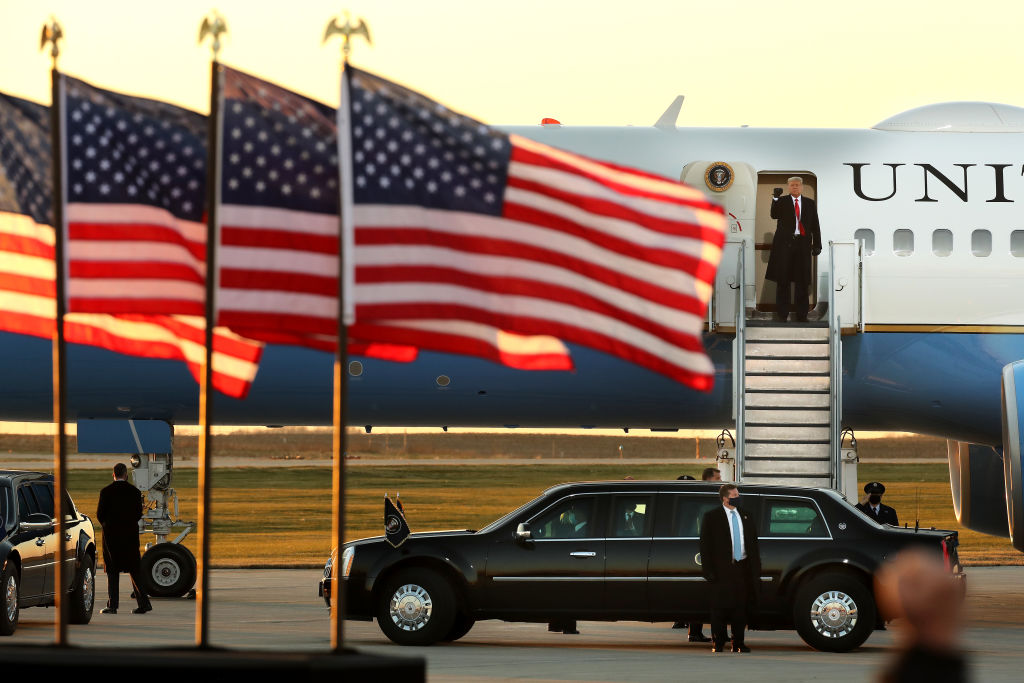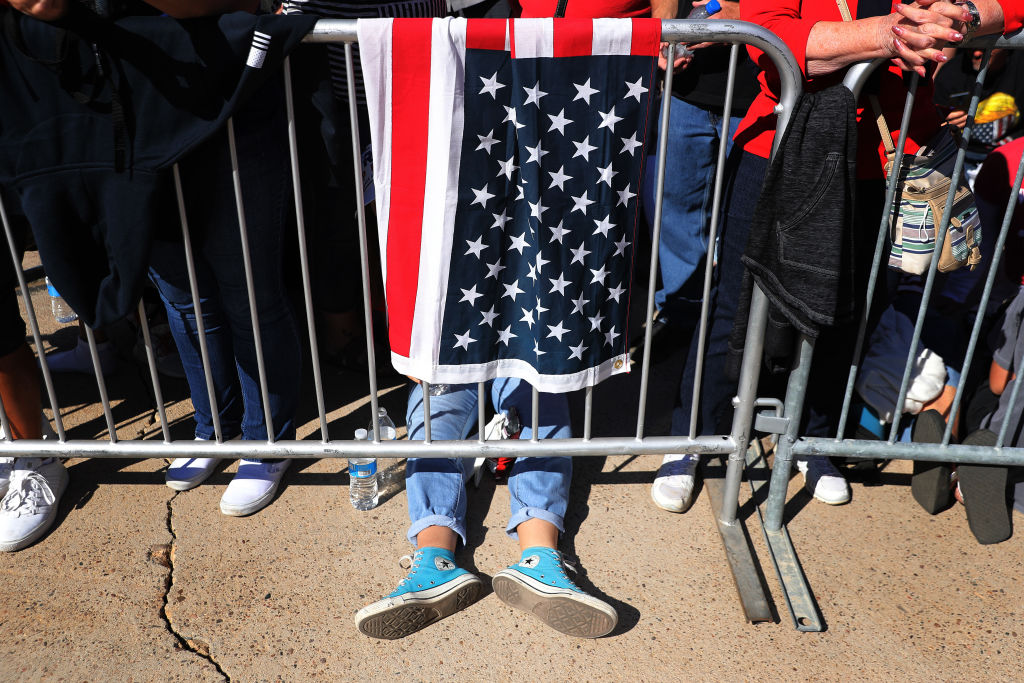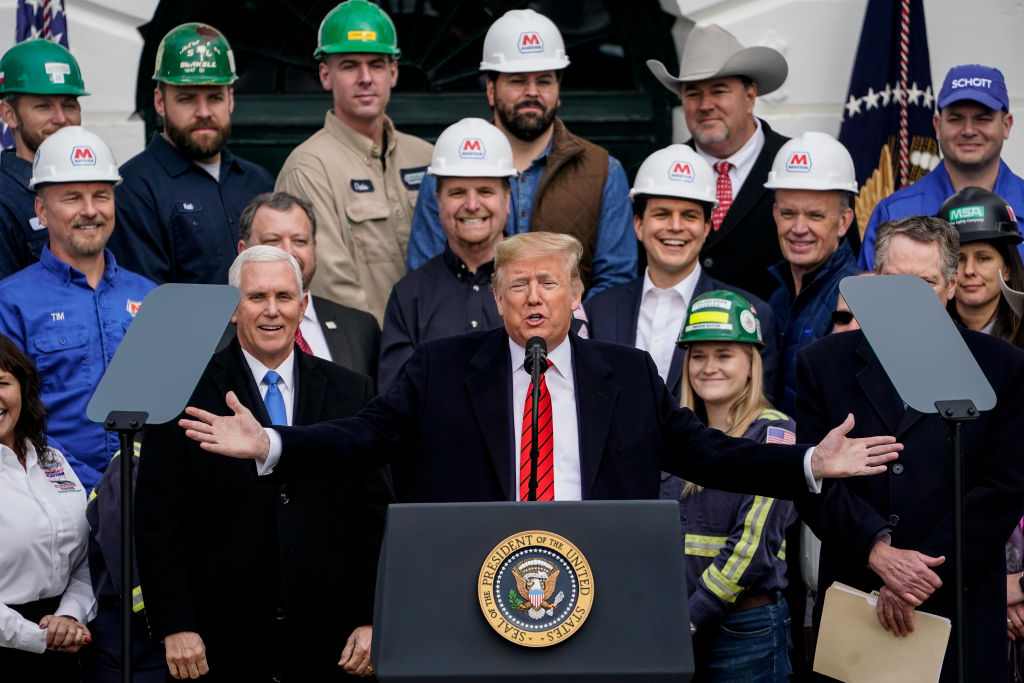Two years ago, Andrew Yang launched his longshot presidential campaign with a startling promise: If elected, Yang would institute a monthly payment of $1,000 in “universal basic income,” or UBI, to every adult American. At first, even some of his most ardent supporters weren’t certain he was being serious.
One of several United States of Inequality stories examining the track records of leading presidential candidates on issues affecting income distribution and social mobility.
This pledge to create a “freedom dividend” to offset the disruptive force of automation on working families became the foundation of his campaign, and it gained a groundswell of support that carried the former entrepreneur and attorney from obscure niche candidate to regular presence on the Democratic debate stage.
At last week’s televised debate in New Hampshire, Yang declared: “These communities are seeing their way of life get blasted into smithereens. We’ve automated away four million manufacturing jobs and counting.”
It’s an alarm he’s been sounding since the publication of his 2018 book, The War on Normal People: The Truth About America’s Disappearing Jobs and Why Universal Basic Income Is Our Future. His support has come from first-time voters and former Trump followers, anxious Democrats and libertarians, young students and weary boomers.
Notwithstanding his disappointing showing at the Iowa caucuses on Feb. 3, Yang has at least one outspoken demographic nearly locked up: comedians.
Comic icon Dave Chappelle campaigned for him in South Carolina, and in the months leading up to last week’s chaotic caucuses, Yang signed up comics Michelle Wolf and Tommy Chong, Doug Stanhope and John Leguizamo. Meanwhile, Ken Jeong (known for The Hangover) wanted to know: “Can I have an advance on that thousand bucks?”
During a debate in September, Yang announced a plan to have his campaign give 10 families a monthly payment of $1,000 for a year to demonstrate the potential impact of his universal basic income plan. Mayor Pete responded with an actual double take onstage, and said, “It’s original, I’ll give you that.”
The Yang program would require that Americans choose between this monthly check and access to core federal benefits, including Supplemental Nutrition Assistance Program (aka food stamps) and Temporary Assistance for Needy Families (aka welfare). It would also be paid for, he says, with a mixture of spending cuts, economic growth and new taxes – including a carbon tax and a 10 percent value added tax.
“The Freedom Dividend is just a foundation or a floor. … It’s not a magic bullet. It does get the boot off of people’s throats. It does help reverse the mindset of scarcity that is tearing us apart,” Yang explained in an October 2019 interview with the Washington Post. “We need to actually rewrite the rules of our economy from the top down to become a trickle up economy … And the most effective way to do this is to make us all participants and shareholders in the progress of the 21st century.”
Yang is the son of Taiwanese immigrants (who met as grad students in California), and graduated from Brown University and Columbia Law. At 45, he is married and the father of two boys, ages 7 and 4, and is the second-youngest candidate in the race (after Pete Buttigieg, 38). In 2011, he founded Venture for America, a nonprofit program to encourage recent college grads to launch their own companies. It got him an invitation to the Obama White House a year later, and it’s partly what sent him down a path toward politics and an idealistic UBI plan to lift each adult man and woman equally.
Yang says delivering more money into American households will lead to higher graduation rates, improved mental health and decreased domestic violence. He’s now made that concept central to his public identity, bringing the idea of a monthly $1,000 check for all adults closer to the mainstream of political debate. Few expected him to get this far in the Democratic race, even qualifying to appear at all but one of the candidate debates. Which means he’s unlikely to walk away now, regardless of how his campaign ends.
* * *
The concept of universal basic income did not originate with Yang but has been on the margins of modern American economic thought for decades. It dates back to the 18th century, and Thomas Paine was an early advocate of a form of UBI in the newly formed United States. More recently, Hillary Clinton revealed in her post-2016 campaign memoir What Happened that she seriously considered adopting UBI as a means to raise millions of Americans out of poverty. Ultimately, “we couldn’t make the numbers work,” she wrote. “We decided it was exciting but not realistic, and left it on the shelf.”
Yang calls UBI a necessity. It isn’t immigrants who are stealing American jobs, he warns, but robots. “Automation doesn’t just affect millions of factory workers and truck drivers,” he wrote in a New York Times opinion piece last November. “Bookkeepers, journalists, retail and food service workers, office clerks, call center employees and even teachers also face the threat of being replaced by machines.” In the last two decades, five-million manufacturing jobs have been lost, he added. “88 percent of factory job losses from 2000 to 2010 were caused by automation.”
Yang’s embrace of UBI is at least public acknowledgement of ongoing “economic inequality” in the country, said Kent Wong, director of the UCLA Labor Center. “With the rise of automation, we see a continued threat to the livelihood of working class people. There has been a lot of discussion on universal basic income among many in progressive circles, but it is not universally embraced.
“Other people raise concerns about the huge drain that [it] potentially would cause on the federal government,” Wong added, “while not necessarily really addressing the need for more progressive taxation.”
With cuts to federal programs and entitlements only increasing during the Trump years, UBI is embraced by supporters as a future end run around a failing safety net. Economist and Times columnist Paul Krugman has called the idea an “escapist fantasy for centrists.”
“It’s not as radical an idea as people think,” said Imara Jones, a commentator and journalist on politics and the economy. “And if you care about economic fairness, it is a way to do it.”
As poverty and homelessness become an accelerating crisis in American cities, Yang’s proposition has won some real traction for the unknown niche candidate. “He’s raising consciousness about it,” said Bob Shrum, a veteran senior consultant for several Democratic presidential campaigns. “I don’t think it’s just his proposals. He is unusual, interesting, smart, direct, and that has an appeal to a lot of people.”
At the California Democratic Convention in Long Beach last fall, Yang supporters were especially visible, carrying signs and chanting for his improbable campaign. They were an energetic bunch, ranging from first-time voters to gray-haired boomers.
Among the Yang contingent was Jenna Lloyd, 56, an active volunteer since June 2019, after her adult son mentioned something about the candidate who wanted to give everyone $1,000 a month. “I thought it was a great joke,” Lloyd recalled. Soon after, she Googled Yang’s name, liked what she saw, and signed up.
Normally registered as “decline to state,” she considers herself more an independent than committed Democrat. “I hate labels,” said Lloyd, an IT consultant based in Irvine. This is her first time volunteering and donating to a presidential campaign, inspired by hearing from Yang a message “so different and so refreshing. It did seem like an awakening for a lot of us.”
Yang is a different kind of insurgent, an entrepreneur whose positions align in many ways with those of Sanders, whom he supported in 2016. Both have made economic equality a central theme, even while proposing vastly different remedies. Both warn of the coming catastrophe of climate change and support replacing the Affordable Care Act with “Medicare for All.”
“But I think I have a more modern approach,” he told Showtime’s The Circus recently, while admitting he never would have run if Trump had not won the White House. He supported Clinton in the general election, he said, “because I’m pro-civilization.”
Yang shows up at debates and campaign events dressed in minimalist business attire: a suit jacket over a blue dress shirt and no tie. On his lapel is a pin with the campaign catchword “MATH” — for “Make America Think Harder.”
“He’s brought a degree of fun to the campaign,” said Shrum. “And his events are spontaneous and original. So he’s made a mark, and nobody would have predicted that he would make a mark.”
Even if Yang’s campaign falls short this year, it has the makings of a movement, with a distinctive and energetic candidate “laser focused” on cyber security and the accelerating threat of automation to working families in the U.S. He warns of an oncoming wave of robots and artificial intelligence that will displace factory workers and service jobs. Truckers will lose their careers to self-driving vehicles, he says, and shopping malls will close across the country, while Amazon enjoys soaring profits and a modest tax rate.
He wants to legalize marijuana, in part, as “a safer approach to pain relief than opiates,” and once tweeted out a photo of himself exulting in a grow room filled with tall pot plants.
On climate change, he pledged to “zero out” all federal subsidies for the fossil fuel industry and shift them to wind and solar. Yang also noted that as the producer of 15 percent of all global warming emissions, the United States can’t solve the crisis alone, but should invest in guiding the developing world away from dirty energy sources.
“When politicians talk about preventing climate change, I get frustrated,” Yang said at a CNN Town Hall on Feb. 5. “You can’t prevent something that is already here and having disastrous effects around the country.”
* * *
The morning of the Iowa caucuses, Yang predicted his campaign would “over-perform tonight.” Instead, the neophyte politician came in at No. 6 with just 1 percent of the vote. It was a serious blow to a self-confident operation, led by the first candidate to announce his run in 2017. Leading up to the vote, Yang said he had appeared at 180 events in the state and closed with a 17-day road trip on a bus painted with the words, “A new way forward.”
Within days of what Politico called “an abysmal finish” in Iowa, Yang laid off dozens of campaign workers, including several senior level staffers. Another sign of panic was that many of them had their email and Slack accounts cut off before being informed they were being let go, according to the Politico report.
“Iowa is a test of organization,” said longtime University of Southern California political scientist Sherry Bebitch Jeffe. “The history has been that if you do anywhere near as badly as he did in Iowa, it’s time to reassess and gracefully leave the arena.”
An Emerson College poll released just before the Iowa caucuses showed that 42 percent of Yang supporters would not support the eventual nominee if their candidate wasn’t chosen. Second highest were Sanders supporters, whose “Bernie or Bust” diehards only amount to 16 percent. (The lowest was zero, for Warren supporters.)
The numbers suggested that at least part of Yang’s following are not normally Democratic voters. There is some natural libertarian appeal to his UBI plan, and Yang welcomes that support from outside the party. A vaguely post-partisan message remains one of his key selling points. Yang has spent little time attacking President Trump, even during impeachment.
At last week’s New Hampshire debate, he separated himself from the pack when he announced: “Donald Trump is not the cause of all of our problems, and we’re making a mistake when we act like he is. He is a symptom of a disease that has been building up in our communities for years and decades.” It was his most quoted statement following the debate.
Whatever Yang’s natural appeal as a candidate, his rise as neophyte politician hit a ceiling by the time of Iowa. Amid the layoffs following the caucuses, Politico indicated a Yang campaign hobbled by several senior staffers with zero political experience. A strangely unresponsive press operation also didn’t help. (Yang’s campaign did not respond to requests for interviews for this story.)
In the fall, Yang began a feud with MSNBC, whose audience of center-left Democrats, independents and combative never-Trumpers is a constituency crucial to any primary candidate. He refused to appear on the network until he received an on-air apology for a series of slights that were fairly unremarkable for a mid-tier candidate struggling for airtime: being asked too few questions at an MSNBC debate, an incorrect photo being used in a graphic on sister network CNBC, etc.
“They think we need them,” Yang tweeted. “We don’t.” A month later he was back on the network.
As a political novice, unforced errors are to be expected. “I’m not a career politician … I’m a data and numbers guy,” Yang repeats regularly, and it’s part of his appeal.
Yang’s time on the campaign trail will be limited if he fails to perform in New Hampshire, Nevada and South Carolina. But he has already made a mark, outlasting several better-known career politicians. His future as a public figure appears open-ended.
“When you go through something like this and do well, but you don’t win, the big question is: What do you do afterwards now that people want to pay attention to you?” said Shrum. “If he wants to be, I think he’ll be around. He can be a voice. He can have influence. He can run again.”
Photo of Andrew Yang during the California Democratic Party Convention
by Steve Appleford.
Copyright Capital & Main





